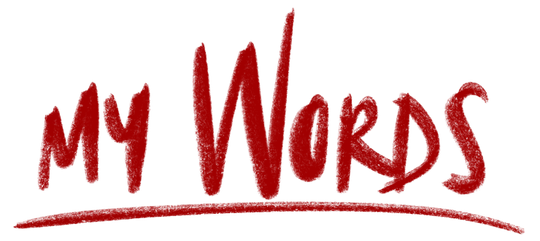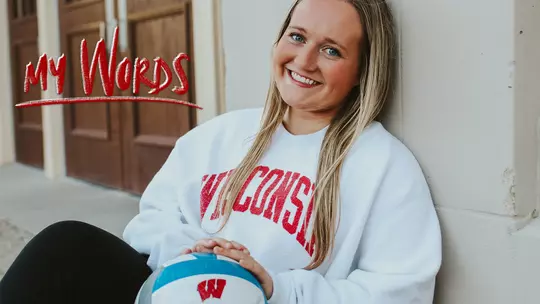
My Words: My dyslexia allowed me to find my super power
By Joslyn Boyer, Wisconsin Volleyball
12/4/2023
I don’t like it when people say I have a disability even though it’s the truth.
I don’t like it when people assume my life will be a never-ending struggle even though that’s been my reality.
I not only refuse to allow dyslexia to dictate who I am, I’m determined to use it as motivation for all I want to accomplish.
I believe that being dyslexic has already made me a better daughter, sister, friend, student and teammate. It’s also made me a better libero for the Wisconsin volleyball team.
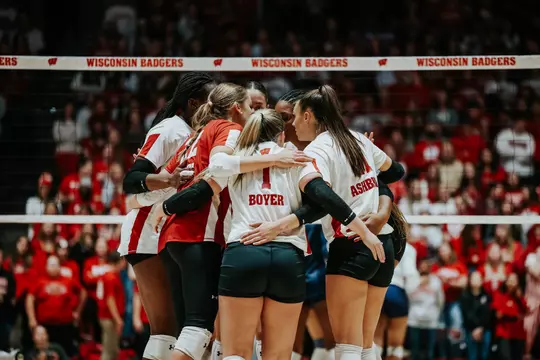
Dyslexia is a life-long learning disorder that involves difficulty reading due to issues identifying speech sounds and learning how they relate to letters and words on a page.
It’s not an obvious thing. If you didn’t know I was dyslexic, you wouldn’t know just by looking at me or talking to me. I was lucky that my parents, Brooks and Julie, realized something was a little bit off about me when I was around 3. They noticed that I wasn’t picking things up as quickly as my younger sister, Kylie, who knew sight words and math facts and was reading before I was. I’m very grateful that my mom and dad got me diagnosed.
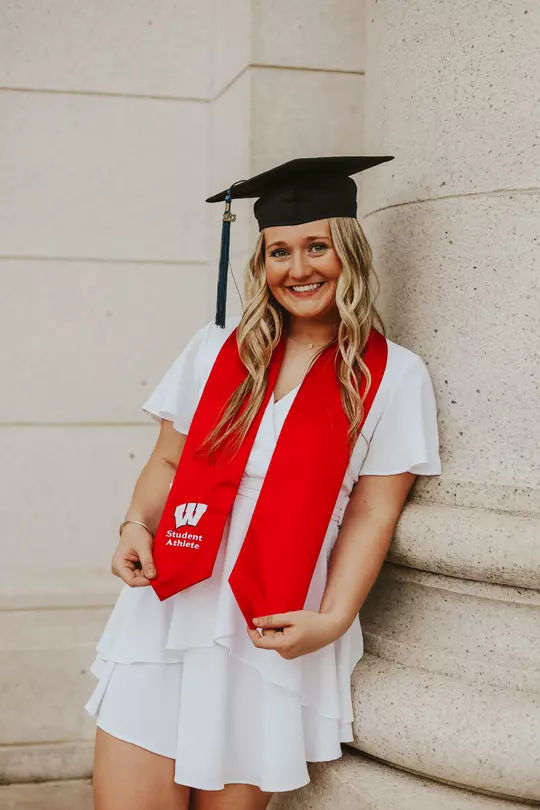
As a result, I had to learn at a young age how my brain works and how I’m able to process information. It became clear that my process of learning would be different than everybody else. I can’t just pull things out of thin air. Learning, for me, is very visual. It’s very hands on. It’s writing things down over and over again before actually memorizing it. If it takes you two hours to study for a quiz, it takes me three or four.
I feel awful for the people that don’t know that they’re dyslexic. That they don’t know that they need that extra push, that extra teaching or just a different way of learning. They think they’re stupid. They’re not stupid. They just have not learned how to train their brain.
The problem with not having dyslexia diagnosed early is that you can fall into a deep, dark hole and not find your way out until it’s too late. You don’t think anything can be done and you fall farther and farther behind. By the time high school hits, you’re so far behind everyone else that you can’t catch up. I can’t imagine trying to carry that burden.
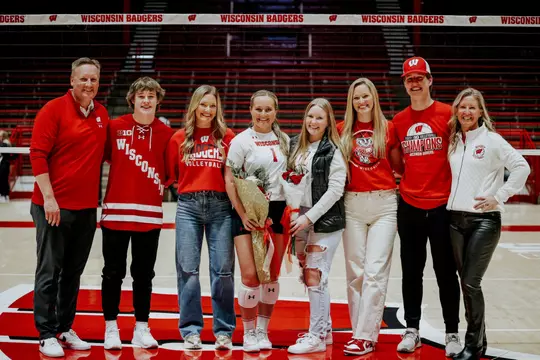
I was lucky. From the moment I was diagnosed, my mom became my advocate, my bright light on what would have otherwise been a pretty dark path. Finding the right doctors and support people was hard, but she persisted. Finding the right message for my teachers – educating them on what accommodations I needed – was a challenge, but she got her points across and I got the support I needed.
It was hard to get through early on, but by the time I hit eighth grade and high school, I was going up to my teachers saying, “This is what I need and this is why.” And going up to my friends and saying, ‘’My brain works differently and I need more time.” I had become my own advocate.
It helped that my parents got me a tutor from second to eighth grade. Learning the basics was different for me. I was taught that I had to go to that extra class after school and get more input. Doing this extra work became very normal for me. This is how I was training my brain.
Having dyslexia is a hardship for many, but I don’t like to think about it that way. I like to look at it something in life that gave me a better work ethic. I had to put in more hours than everybody else. I had to put in the time to see positive results. Ironically, having dyslexia allowed me to find my super power. It’s the belief in myself that I truly can do anything, but also understanding that nothing comes easy. Everything has to be earned even if you put in a lot of extra work.
Having dyslexia is a hardship for many, but I don’t like to think about it that way. I like to look at it something in life that gave me a better work ethic. ... It’s the belief in myself that I truly can do anything, but also understanding that nothing comes easy. Everything has to be earned even if you put in a lot of extra work.Joslyn Boyer

My parents went above and beyond to help me confront the challenges of dyslexia, but they didn’t take it easy on me. They expected good grades – I got straight A’s in high school – and no excuses. They also expected me to set the best possible example for my brothers and sisters.
I have five siblings and four – sisters Reeghan and Brynlee and brothers Quinn and Brody – are also dyslexic. I think what best helped them was seeing how open I was about it, how I wasn’t afraid to go advocate for myself to professors and teachers, and also how normal I was when people asked me about it. It’s just part of who I am and I’m completely comfortable with it.
It’s not a secret. It’s just who we are and we can’t change it. There’s no medication. There’s nothing to fix. I can’t unlearn being dyslexic. I’ve always felt a sense of responsibility that it’s important to show my siblings that being dyslexic isn’t something to be embarrassed about or something that should be scary to talk about. It’s who you are.
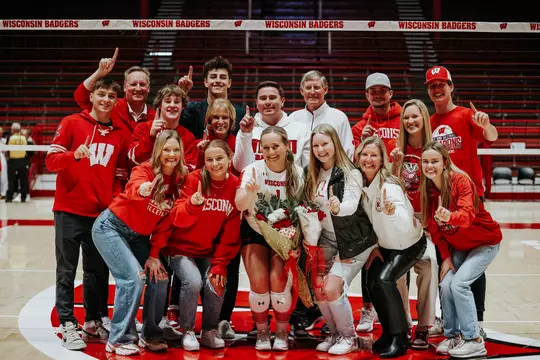
I grew up in Downers Grove, Ill., and started my college volleyball career at Iowa in 2019. I transferred to Wisconsin in 2021 and graduated last May with bachelor of business administration in finance, investment and banking degree. I’m now pursuing my Masters of Business Administration post-graduate degree with a concentration in applied securities analysis. School has never been easy. It’s never going to be easy. I’m proud of the fact that my grade-point average is above a 3.0 because I’m in the Wisconsin Business School and the people I’m around every day are really smart. By what I’ve learned about myself and how my brain works, I’m learning right alongside my peers.
The impact that dyslexia has had on my school work varies, especially for different courses and different assignments. I tackle them differently. It comes with repetitions, kind of similar to volleyball. The more reps you get, the better you get. The more reports I get to write, the more books I read, the better I get and the more I learn how to tackle those projects.
I have two provisions for my condition which I see not as an extra benefit, but a way of leveling the playing field. One is double time; if everyone else gets two hours to complete an assignment, I get four. The other is more graphic; because I can’t always differentiate between a “D” and a “B” on multiple-choice questions, I tell a proctor which bubbles to fill in. This helps me focus on what I should be focused on: completing whatever assignment or test thoughtfully instead of worrying about the time limit or which circle to fill in. Like everyone else, I’m tested on my knowledge.

Yes, having dyslexia is a disability, but I don’t treat it as one. Like I said before, I think it’s a super power, not an excuse. My brain just works differently than other people and that can help in certain aspects. I can be more creative. I can think outside the box. I can see things differently than other people. I think that’s cool.
The only thing dyslexia complicates with volleyball is the scouting report. I spend more time reading it, studying it, watching film. It’s the same as studying for school. If anything, it’s probably made me a better athlete because I’m able to just go play and be free and be like everyone else. It’s a gift God gave me.
The worst part about having dyslexia is how time consuming it can be. Sometimes I’m sitting there for 3½ hours doing exams. But I’ve gotten used to that. That’s normal to me now. I’ve gotten very good at time management.
I’ll never get to a point where I’ve got my dyslexia figured out, but I’m not intimidated by it.
I read that one in every six persons has dyslexia and most just don’t know it. To my knowledge, no other UW student-athlete has it, which is amazing to me.
For those who have been diagnosed, my advice is simple. First, you’re going to have work really, really hard. It’s going to be difficult and you’re going to have to put in a lot of time if you want to succeed. From time to time, you’ll doubt yourself. But if you create the work ethic, you can do it.
Second, advocate for yourself to teachers and professors who might not get it. Go in for extra office and study time. Try to make them understand your challenges. All you’re asking for is a level playing field and you can get it. The most important part about overcoming dyslexia is knowing how you learn.
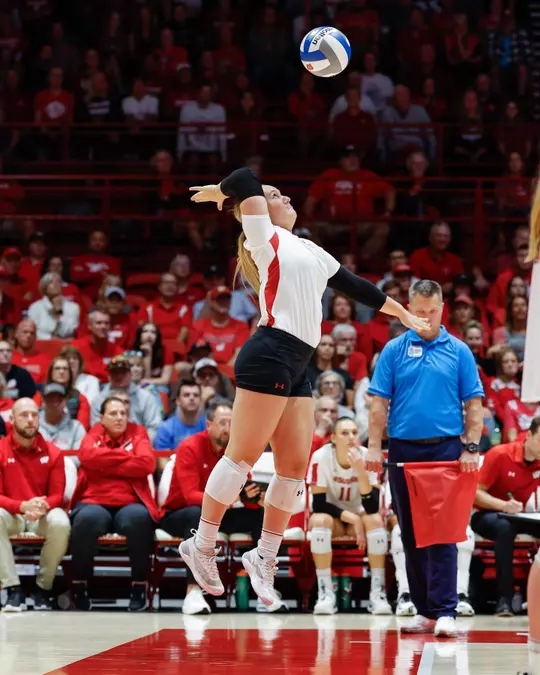
Having dyslexia is a daily test of your will, but it’s also a revelation. I’m one that definitely is not afraid of challenges whether on the volleyball court or in the classroom. Having dyslexia has taught me to compete, to believe in myself and know that if I put in the work, my destiny is in my own hands.
I refuse to allow dyslexia to determine who I am. It’s part of me and I’m so appreciative that I was diagnosed early so I could be an honor roll student, a competitive athlete and an advocate. My hope is that this column is read and makes a parent or grandparent or friend think, “Maybe we should have him or her tested.” Then those kids end up getting the support and accommodations necessary to become whatever they want to be. They will know they’re not stupid. They will be proud that their brain works a little bit differently. After all, there’s nothing wrong with that.
On, Wisconsin.

